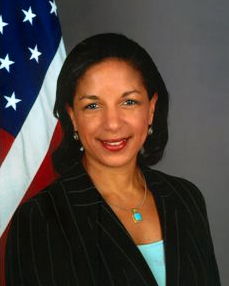
Susan Rice Speaks at Stanford About Climate Change
On Monday, October 12, former ASP board member and current national security advisor Susan Rice spoke to a Stanford crowd about the ill effects of climate change and our global response to it. She began by noting our failure to adequately respond, and the consequences that ensued.
“We failed, repeatedly,” she claimed, “to treat this challenge with the seriousness and the urgency it deserves.” Part of the reason this occurred, she argued, dealt with divisive politics and denialism. Another part dealt with other national security concerns, particularly terrorism and nonproliferation.
Still, a failure to act has led to and will continue to lead to disastrous consequences. We have already seen some of the hottest years on record, and a failure to act swiftly and effectively will threaten our national security in multiple ways.
One way involves prolonged droughts and billions in damages from failed crops. In contrast, trends in record flooding causes billions in damage to infrastructure and directly threatens lives.
These trends also threaten our national defense. According to Rice, rising sea levels imperil our infrastructure and jeopardize training facilities. This, in conjunction with the possibility of new sea lanes to secure due to the thawing Arctic, places incredible stress on our military and equipment. It also means more humanitarian missions as seen in the Philippines.
Natural disasters spurred by climate change can amplify conflict in certain regions, something the Department of Defense calls a “threat multiplier.” A changing climate will make it harder for societies to grow a sustainable amount of crops, incentivizing them to migrate. As Rice bluntly put it, “Rather than stay and starve, people will fight for their survival.” We have already seen examples of this occurring in Nigeria and Syria, where droughts contributed to instability and violent conflict.
These damages become exacerbated by the onslaught of illnesses. A warming climate encourages migration of mosquito-borne diseases. Crops, livestock, and humans face these threats, which will cost billions in damage and a countless number of lives.
Lastly, Rice noted the “irreparable damage to our environment” climate change can cause. Seas could rise “as much as 20 feet” if the Greenland ice sheet melts, and the coral reefs face destruction if oceans continue to acidify.
However, Rice showed some optimism. “We’re at an inflection point. Attitudes are shifting. Behaviors are changing,” she said.
She noted some of President Obama’s achievements regarding climate change. This includes advancing green energy development and utilization, doubling fuel efficiency, set new conservation standards for buildings, and develop strategies to reduce carbon emissions and other greenhouse gasses.
Other nations have joined as well, thanks in part due to the galvanizing efforts of President Obama. International cooperation remains crucial, and Paris provides, as Rice put it, the “best opportunity to shift our approach toward climate change permanently and to embrace cooperative solutions to a truly global problem.”
So far, more than 140 countries have set ambitious targets, including major emitters such as the EU, Brazil, and Mexico.
However, Rice called upon the need for Paris to establish a long-term framework that ensures countries will act. Paris should also assist poorer countries in achieving climate goals. While Rice acknowledges the progress this illustrates, she also reaffirms the domestic work needed.
“It’s critical that Congress pass a budget that reverses sequestration,” she argues. Doing so would allow us to continue to adequately fund our climate initiates.
She closed by calling upon the students to take charge – in engineering, agriculture, or innovation – in battling climate change:
“Find ways to fight climate change. Find the work you are passionate about, and make this part of it. Because, just as President Obama and I have a responsibility to you—to try to make sure the world you inherit is not plagued by problems left too long, by threats grown too large—you have a responsibility to those who will follow you.”
Further Readings
Climate Change and National Security
Investments in Clean Energy Make Us Safer
Reducing Our Dependence on Fossil Fuels is a National Security Imperative





